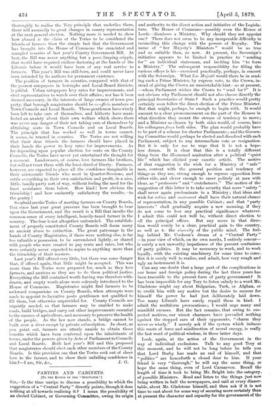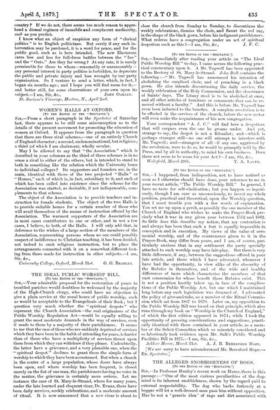PARTIES AND CABINETS.
[TO THE EDITOR OF THE ISPECTATOR.1
Six,—Is the time unripe to discuss a possibility to which the suggestion of a " Central Party " directly points, though it does nothing at all towards realising it ? I mean the possibility of an elected Cabinet, or Governing Committee, owing its origin
and authority to the direct action and initiative of the Legisla- ture. The House of Commons—possibly even the House of Lords—dismisses a Ministry. Why should they not appoint one ? There does not seem to be any insuperable difficulty in reconciling this change with the powers of Royalty. The name of " her Majesty's Ministers " would be as true- and as suitable then, as now. At present, the Sovereign's initiative appears to be limited in practice to " sending for " an individual statesman, and inviting him " to form a Ministry." The subsequent responsibility for filling the various offices is his—exercised practically, perhaps, in concert with the Sovereign. What lose Majeste would there be in send- ing such a Prime Minister, by express vote, to the Crown, in- stead of giving the Crown an unmistakable hint—as at present, —whom Parliament wishes the Crown to " send for P" It is not obvious why Parliament should not also choose directly the principal Secretaries of State ? Such a practice would pretty certainly soon follow the direct election of the Prime Minister. But that might, perhaps, be enough to begin with. It would amount to a clear pronouncement on the part of the Houses in what direction they meant the stream of tendency to move; and a Minister so chosen by both sides would, of course, have his colleagues from, both sides. The plan would probably have to be part of a scheme for shorter Parliaments ; and the Govern- ing Committee would perhaps be elected and dissolved with each Parliament, subject to any intermediate vote or resignation_ Butit is only for me to urge that it is not a hope- less dream. It is clear that this is a totally different thing from the ill-omened aspiration after a political " quiet life " which has elicited your caustic article. The motive of that suggestion is the wish for a Ministry of " safe " men, content with the general position and tendency of things as they are, strong enough to repress opposition from either side, and clever enough to sneer politely at men with ideas, as " professors " and " crotcheteers." The motive of the suggestion of this letter is to take security that mere " safety " shall never again predominate in a Ministry ; that ideas and wish for action and movement shall have their natural chance of representation, in any possible Cabinet ; and that "party interests " shall gradually acquire a new meaning, if they do not come to lose any practical significance whatever. I admit this could not well be, without direct election to all the principal offices. But any move in that direc- tion would surely be a clear, practical gain to the country, as well as ti the sincerity of the public mind. The feel- ing behind Mr. Cookson's dream of a "Central Party" —in your view of which, on its own merits, I entirely concur— is surely a not unworthy impatience of the present confusions of party politics. It may be necessary to work, and to work loyally, with the existing machinery for some time to come.. Butit is surely well to realise, and admit, how very rough and ugly an instrument it is.
Can any one doubt that a large part of the complications in our home and foreign policy during the last three years has been traceable to the present form of party government? It has been impossible for any Tory to listen calmly to a word Mr- Gladstone might say about Bulgarian, Turk, or Afghan, or to credit him with any motive but the desire to recover for himself the power he had just deliberately laid down.. Too many Liberals have surely repaid them in kind. I admit the multiform provocations ; I would urge many and manifold excuses. But the fact remains, that owing to sus- pected motives, our wisest charmers have prevailed nothing against the stopped ears of their opponents, " charm they never so wisely." I merely ask if the system which induces this waste of force and misdirection of moral energy, is really the last word of political wisdom, in these latter days.
Look, again, at the action of the Government in the way of individual exclusions. Talk to any good Tory at this moment, and he will not be long before he tells you that Lord Derby has made an end of himself, and that " politics " are henceforth a closed door to him. If yottr friend is very "thorough," he will say the same thing, or hope the same thing, even of Lord Carnarvon. Recall the length of time it took to bring Mr. Bright into the category. of possible Ministers. Read and listen to the things just now being written in half the newspapers, and said at every dinner- table, about Mr. Gladstone himself, and then ask if it is not time to cast about for some way of securing more certainly than at present the character and capacity for the government of the .country If we do not, there seems too much reason to appre- hend a dismal regimen of immobile and complacent mediocrity, Sad` as you predict.
I know what an object of suspicion any form of " clerical politics " is to English politicians. But surely if any such in- tervention may be pardoned, it is a word for peace, and for the public good, such as is here intended. The new Electorate cares less and less for full-dress battles between the " Ins " and the " Outs." Are they far wrong P At any rate, it is surely permissible for those to whom—reasonably or unreasonably— any personal interest in party politics is forbidden, to deprecate the public and private injury and loss wrought by 'our party organisation. So I venture to send a letter, which, in fact, I began six months ago ; and I hope you will find room for it,— and better still, for some observations of your own upon its



































 Previous page
Previous page